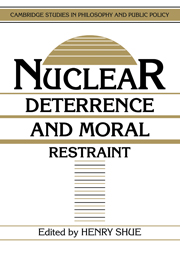Book contents
- Frontmatter
- Contents
- Preface
- Notes on contributors
- Introduction
- 1 Having it both ways: the gradual wrong turn in American strategy
- 2 Finite counterforce
- 3 Deterrence and the moral use of nuclear weapons
- 4 Escaping from the bomb: immoral deterrence and the problem of extrication
- 5 The necessary moral hypocriy of the slide into mutual assured destruction
- 6 Finite deterrence
- 7 Defending Europe: toward a stable conventional deterrent
- 8 The case for deploying strategic defenses
- 9 Morality, the SDI, and limited nuclear war
- Index
5 - The necessary moral hypocriy of the slide into mutual assured destruction
Published online by Cambridge University Press: 26 January 2010
- Frontmatter
- Contents
- Preface
- Notes on contributors
- Introduction
- 1 Having it both ways: the gradual wrong turn in American strategy
- 2 Finite counterforce
- 3 Deterrence and the moral use of nuclear weapons
- 4 Escaping from the bomb: immoral deterrence and the problem of extrication
- 5 The necessary moral hypocriy of the slide into mutual assured destruction
- 6 Finite deterrence
- 7 Defending Europe: toward a stable conventional deterrent
- 8 The case for deploying strategic defenses
- 9 Morality, the SDI, and limited nuclear war
- Index
Summary
The central moral paradox of nuclear deterrence theory is that peace (a morally very desirable good) is preserved by each superpower's immorally threatening the lives of millions of innocent people on the other side. The victims are people who would probably not have approved of the conventional aggression or nuclear surprise attack that began a war, but who must bear the brunt of the retaliation that turns the war into our worst nightmares of World War III. The prospective suffering of such innocents, the prospective destruction of the cities in which they live, presumably deters their leaders from ever beginning such wars in the first place, i.e. deters the prospectively guilty from becoming the guilty.
Various proposals for alternatives to deterrence can be supported by practical arguments that they might actually improve the situation of Americans or others, as we balance all the contingencies against each other. Yet such proposals for disarmament, or for antimissile systems as in Reagan's Strategic Defense Initiative, or for a reliance on conventional defenses so as to limit nuclear weapons to deterring each other and nothing more (perhaps this is where the 1987 Reagan–Gorbachev INF Treaty is to take us?) all also stem in part from the moral problems of continuing to accept Mutual Assured Destruction.
Preventing crime by punishing the loved ones of those who would have become criminals is certainly an alien and distasteful idea for anyone accustomed to the cultural traditions of the Western world. We cannot think of anything else for which we use such a bizarre mechanism, except the preservation of peace in the years after 1945.
- Type
- Chapter
- Information
- Nuclear Deterrence and Moral RestraintCritical Choices for American Strategy, pp. 227 - 270Publisher: Cambridge University PressPrint publication year: 1989



